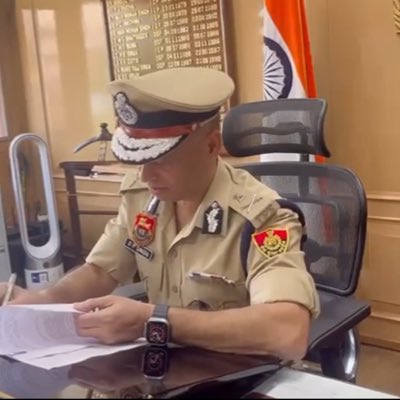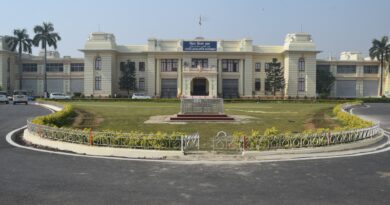Haryana DGP OP Singh’s Fourth Directive: Shrink Tables, Ditch Towels on Chairs for Humane Policing
DGP OP Singh’s fourth letter orders smaller tables, no towels on chairs, and visitor-friendly reforms to make Haryana police stations empathetic hubs of service.
Chandigarh, October 22, 2025 – In a bold push to humanize Haryana’s police stations and transform public interaction from intimidation to empathy, newly appointed Director General of Police (DGP) OP Singh has issued his fourth open letter to officers, urging a complete overhaul of office culture and complaint resolution processes. Assuming charge on October 15 at the Panchkula Police Headquarters, Singh’s latest missive targets SHOs, DSPs, ACPs, SPs, DCPs, CPs, IGs, and ADG range officers, emphasizing that “public dealing is a fine art” tied to office design, soft skills, and management acumen.
Titled informally in media circles as a blueprint for “service-oriented policing,” the letter arrives amid Singh’s rapid-fire series of directives aimed at fostering harmony and efficiency in the force. Previous letters had called for creating an environment where “lions and goats drink water from the same pond” (first letter), urged senior officers to step out of offices and avoid harassing the public with vehicles (second), and rejected colonial-era lathi-charge tactics in favor of motivational rule-following (third). This fourth installment dives deeper into grassroots reforms, with actionable steps to make police outposts welcoming spaces rather than fortresses of fear.
#### Redesigning the Police Office: No More ‘King’s Throne’
At the heart of Singh’s vision is a radical redesign of police offices to eliminate hierarchical barriers. “First, make the size of your office table smaller. Make your chair and the visitors’ chairs the same. Do not use a towel on your chair at all. It has no meaning,” Singh writes pointedly, critiquing the symbolic towel often draped over officers’ seats as a outdated marker of authority. He insists on removing personnel lacking public dealing savvy from frontline postings: “Those who do not understand public dealing should be removed from police stations and outposts.”
To create a more approachable atmosphere, Singh mandates dedicated visitors’ rooms. “If your office has a conference hall, seat visitors there. If not, convert one large room into a visitors’ room. Keep books of litterateurs like Premchand, Dinkar, Renu there. Appoint one person to ask and serve them tea-water. Appoint a behaviorally skilled policeman who informally talks to them about the purpose of their visit and their problem to make them feel comfortable,” the letter advises. This literary touch, he argues, can ease tensions and humanize interactions.
#### Borrow from Metro Stations: Guided Pathways and Youth Volunteers
Drawing inspiration from urban efficiency, Singh proposes adopting metro rail protocols for navigation within police premises. “Follow foot steps and signage like the metro rail station for people to reach from the gate to the visitors’ room,” he instructs. In a novel community tie-up, he suggests partnering with DAV Police-Public School to train interested students as stewards. “Engage them in volunteer work to receive visitors at the gate and assist them to the visitors’ room. Distressed people will not have to wander, and children will get training in soft skills and sensitivity.”
For meetings, officers must relocate to conference halls if available, seating complainants nearby and practicing active listening: “When people are speaking, keep the mobile away, listen actively. Help them frame the problem properly. Note down their mobile for the policeman who has to handle their work. Tell them that they will contact the complainant.” This shift aims to replace curt desk-side dismissals with empathetic, structured engagements.
#### Swift Action on Complaints: Resolve One in Three Within a Week
On complaint handling, Singh sets a clear timeline: “Within one week, take action on one out of three – first, if a case is made, register it. Second, if the complaint is of civil nature, register it in the CM Window from the police station’s computer itself. If possible, call the concerned officer too. Third, if the complaint is false, record a report in the daily diary and give a copy to the complainant as a warning. If habitual of false complaints, register a case and take action. In all cases, avoid arguments.”
Non-compliance will not be tolerated. “For policemen who do not do this, call them for a hearing, understand the reason, and motivate-train them. If laxity is shown, warn them, and if there is no understanding of public dealing at all, remove them from the police station-outpost and give them another job. There is no wisdom in making a carpenter do a confectioner’s work,” Singh warns. He concludes poetically: “Remember, the police is a force and also a service. You are a wire through which electric current is flowing. People need connection and light from you. Give a shock, by all means, but give it to those who suck the blood of the people.”
#### A Series of Reforms: Building on Prior Directives
This letter builds on Singh’s earlier communiques, which have gone viral for their folksy wisdom and reformist zeal:
– **First Letter (October 18)**: Focused on inter-community harmony, urging an atmosphere where “lions and goats drink from the same pond” to reduce communal tensions.
– **Second Letter (October 19)**: Directed SPs, DCPs, and CPs to “step out of offices; get down from vehicles, do not harass the common public.”
– **Third Letter (October 20)**: Condemned “lathi-danda language as the British’s. Our job is to motivate adherence to rules.”
Issued just a week into his tenure, the fourth letter signals Singh’s intent to reposition Haryana Police as a citizen-centric force, echoing national calls for police modernization under the Modi government’s push for ‘zero FIRs’ and digital grievance redressal. Experts hail it as a “soft skills revolution,” but implementation at over 1,000 police stations will be the true test. As one anonymous officer quipped, “From towel to chai – who knew policing could start with furniture?”




